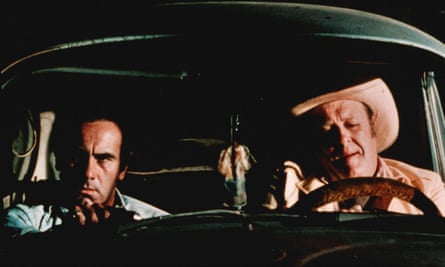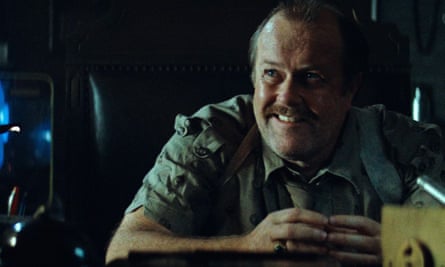M Emmet Walsh was the outstanding Hollywood character actor who emerged in the American new wave, a performer whose mesmerically watchable and powerful looks made him eminently castable; he was jowly and heavy set, but always looked tough, as if the idea of a fistfight would not be a novel or frightening thing for him. But he also had a woundedly sad expression in those poached-egg eyes.
Walsh lent a texture of reality to any picture he was in – like his approximate contemporaries Ned Beatty or George Kennedy, a performer who could be part of the landscape and offset the importance of the male lead, often in some kind of antagonistic or malign authority role. He could be like a gargoyle or an everyman, but never a fool and always someone to be taken very seriously. In his later career, his habitual pairing with the male star found a piquant expression in his moment opposite the young Leonardo DiCaprio, playing the Apothecary in Baz Luhrmann’s Romeo+Juliet (1996).

Of course it was for the Coen brothers that Walsh found his immortal role, the part that made him a noir icon, the epitome of sleaze and skeeze in the 1984 crime thriller Blood Simple, playing the loathsome private detective Visser, a demonically inspired role and a demonically inspired performance. Walsh’s Visser is a reptilian figure of pure evil who first makes his impression on us, not with his face, but the negligent twang of his voice, a deadpan monologue, an aria of cynicism and violence, that we hear over unsentimental wide shots of the stark Texas landscape – the vocal equivalent of a bleak Ry Cooder guitar riff. Fans of this film can pretty much recite it word for word:
The world is full of complainers. But the fact is, nothing comes with a guarantee. I don’t care if you’re the pope of Rome, President of the United States, or Man of the Year – something can always go wrong. You go ahead, complain, tell your problems to your neighbour, ask for help … and watch him fly. Now in Russia, they got it mapped out so that everyone pulls for everyone else. That’s the theory, anyway. But what I know about is Texas, and down here … you’re on your own.
Walsh’s Visser is a creep, a parasite, a liar and a murderer in a Stetson and pale yellow suit, and in his sulphurous wickedness, surely the most evil private detective in movie history: Walsh presented him as someone who inhabited a circle of hell that was his and his only. (In his The End of the Affair, Graham Greene was fascinated by the private detective as the witness to and participant in sin – I often wonder how he would have reviewed Blood Simple and Walsh’s performance.)

Before this, he was almost as potent in Ulu Grosbard’s classic crime thriller Straight Time (1978), based on Ed Bunker’s novel No Beast So Fierce, as the equally disagreeable Earl, the parole officer who from the very first is determined to play unfair with Dustin Hoffman’s thief Max, out from jail on licence, and driven back to crime by Earl’s incessant and almost psychopathic harassment. In a way, this was the more classic Walsh role, in that he was playing opposite the good-looking hero. For Sidney Lumet in Serpico (1973), he was one of the familiar gallery of venal cops who are part of the problem that Al Pacino’s outsider rookie is there to solve. (In Blood Simple, there really is no sympathetic protagonist for Walsh to play off against.)
He could also do comedy, notably as the crazy shooter in Steve Martin’s movie debut The Jerk in 1982, but the comedy consisted in playing the role straight, and of course as in his entire career he just had to do what came naturally. In Ridley Scott’s Blade Runner (1982) he was Bryant, the former commanding officer of Harrison Ford’s ex-operative Deckard, who, with an ambiguous mixture of wheedling and threats, is coerced by Bryant into getting back into action to track down replicants. This was the classic Walsh cop: slovenly and hostile, cynical and calculating, and he made every second of screen time count.
Walsh was an American classic.

